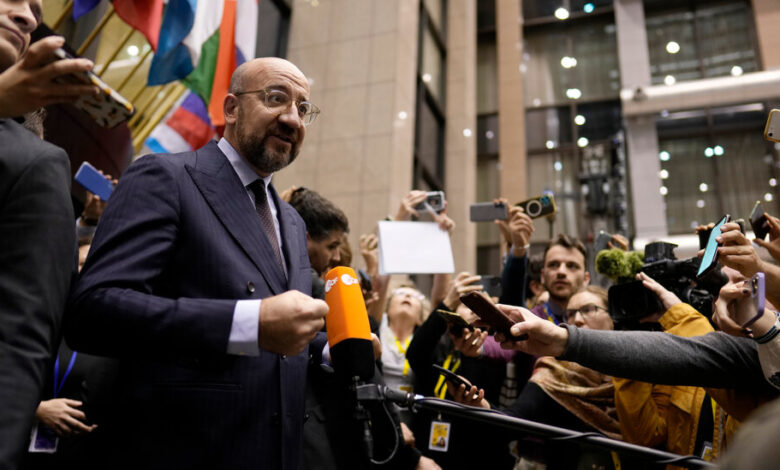Hungary Blocks E.U. Aid for Ukraine

Hungary on Friday blocked the European Union from approving a financial aid package for Ukraine, though E.U. leaders agreed to officially open accession negotiations for Ukraine to join the bloc, an important breakthrough for Kyiv as it tries to bolster support from its allies.
The decision about E.U. accession came at a crucial time for President Volodymyr Zelensky of Ukraine, who had just returned from a bruising visit to the United States, where he pleaded for desperately needed money for his war effort that is being held up by political divisions in Congress.
Even though accession will take years, the announcement on Thursday was a symbolic win that was likely to rile President Vladimir V. Putin of Russia, who has decried Ukraine’s European ambitions as a form of aggression.
“This is a victory for Ukraine. A victory for all of Europe. A victory that motivates, inspires and strengthens,” Mr. Zelensky said on X in response to the news.
The next hurdle for Ukraine will be to secure 50 billion euros — about $52 billion — in proposed aid for the country. E.U. leaders failed to agree on that aid even though they kept negotiating into the early hours Friday.
At the start of the E.U. meeting on Thursday, Prime Minister Viktor Orban of Hungary said he planned to veto an official opening of Ukrainian accession talks, arguing that the country was not ready and that Ukraine’s entry would be bad for the bloc, and for Hungary.
But, in the end, at the behest of Chancellor Olaf Scholz of Germany, Mr. Orban literally left the room when it was time to raise objections to opening those negotiations, allowing the decision to be reached while he effectively abstained.
Negotiations to join the bloc normally take a decade or longer and involve major reforms to align a candidate country with E.U. rules and standards.
Ukraine is seen as a highly motivated candidate, and its government has been following E.U. requests for reforms. But it will still need to radically restructure parts of its governance and apply a raft of stringent rules in its economy, administration and justice systems to one day qualify for accession.
Charles Michel, the president of the European Council, who presided over the meetings, told the news media that 26 E.U. countries backed the financial support for Ukraine, but one did not.
“One leader couldn’t agree on this,” Mr. Michel said at an impromptu news conference at 3 a.m. local time Friday, adding that the leaders would reconvene to try to secure unanimity —which is required for this decision — in “early January.”
Mr. Orban, who in the past has delayed some E.U. sanctions against Russia and is seen as President Vladimir V. Putin’s closest ally in the bloc, had said earlier on Thursday that the aid should come only after Europe-wide elections planned for the summer.
Ukraine can withstand a small delay in the approval of the funds. The E.U. already has funding in place for Ukraine in its current budget, while the $52 billion is earmarked for a new aid package known as the Ukraine Facility that will provide grants and loans to the country from 2024 to 2027.
If Mr. Orban continues to block the funds, the E.U. can still create a trust with the other 26 member countries, which have all signaled their approval. But doing so would be cumbersome and would further illustrate the problems that Mr. Putin relishes: cracks in the group’s support for Ukraine.
“We have various tools in our toolbox to ensure that we deliver on our political promises,” Mr. Michel said when he was asked if the 26 E.U. leaders who agreed on aid for Ukraine could just leave Hungary out of the process.
Critics have said Hungary’s objections to Ukraine’s formal membership talks and long-term funding are best understood as an effort by Mr. Orban to extract E.U. funds earmarked for Hungary. That money has been frozen over its violation of different E.U. rules.
On Wednesday, the E.U. released 10 billion euros, about $11 billion, in such frozen aid. The European Commission, which authorized the release, said it had acted after Hungary had fulfilled demands for judicial reforms. The timing, on the eve of the crucial Ukraine summit, was a coincidence, officials insisted.
Critics decried the move as capitulating to Hungarian “blackmail,” a claim that Mr. Orban rejected. “We are here not to make business,” he said. “It’s not about a bargain. It’s not about a deal. We represent approaches and principles.”
He added: “Hungary does not connect any Hungarian issue to any Ukrainian or other issue.”
Still, in a further sign that he plans to continue upsetting Ukraine’s E.U. progress, Mr. Orban called the opening of formal negotiations a “bad decision.” Balazs Orban, one of his closest advisers, who is not related to the president, suggested on X that Hungary would have multiple opportunities over the course of the negotiations to disrupt Ukraine’s accession talks.
As the year comes to a close, pressure is growing in the United States and the European Union to provide more support to Ukraine, despite political headwinds from powerful minorities.
Warnings have accelerated that the support is critical, with Jake Sullivan, the U.S. national security adviser, saying on Wednesday: “I do not think it’s hyperbole to say that basically the security of Europe is at stake, and therefore the risk of American men and women having to go deal with another massive war in Europe, as we have before, if we don’t work with Ukraine to stop Russia.”
Also on Wednesday, Olaf Scholz, the German chancellor, repeated Germany’s pledge to double aid to Ukraine to nearly $9 billion next year.
“Putin is still determined to bring Ukraine to its knees by military force,” he told the German Parliament. “And he is counting on international support for Ukraine waning. Unfortunately, one cannot deny the danger that this calculation might work out.”
Even if the United States turns away from Ukraine — if, for instance, if former President Donald J. Trump returns to office — “Europe does not have that luxury,” said Nathalie Tocci, director of Italy’s Institute of International Affairs.
“We can’t say, ‘We’re tired, and please Russia take some more,’” she said. “I don’t see the Europeans stopping trying to aid Ukraine, even if our aid is not sufficient.”
With the Americans moving into a difficult election, “Europe needs to own Ukraine,” said Ulrich Speck, a German analyst, instead of feeling that “they participate in a U.S. operation.”
“Europe needs to take responsibility,” he said. “The U.S. is not going to do everything anymore.”
On Thursday evening Kyiv residents greeted the announcement of accession talks with a sigh of relief, describing it as a piece of good news in an otherwise somber period for the country.
“It’s a signal that we’re not left out,” said Victoria Titova, 30, in a snow-covered street of central Kyiv. “It means that this country still has a future.”
Many Ukrainians see integration into the bloc as the only way to obtain guarantees of continued support against Russia’s aggression.
“Only the E.U. will be able to protect us,” said Slava Kosenko, 37. “It’s our only chance.”
Constant Méheut contributed reporting from Kyiv, Ukraine.




